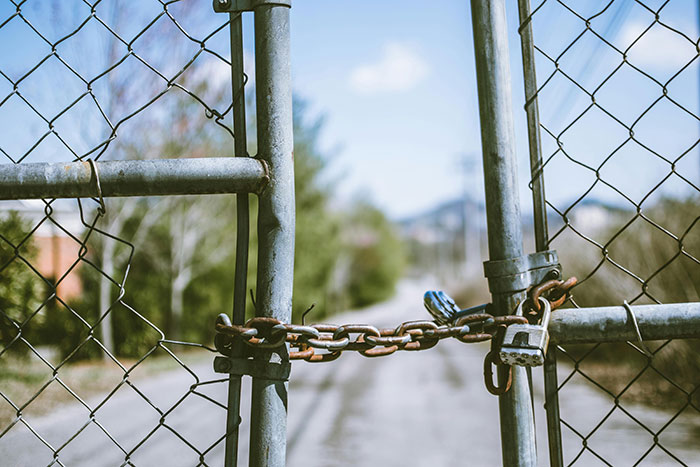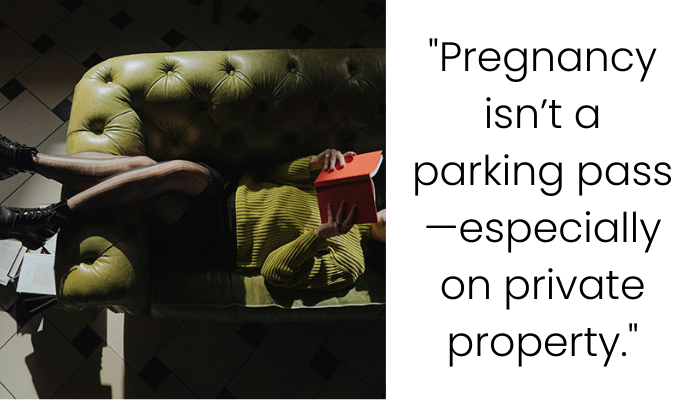Teen Calls Police on Entitled Pregnant Woman After She Refuses to Stop Using His Private Parking Spot
At just 18, OP is basically running the household solo while their mom and brother are away for work. Sounds manageable—until the driveway turned into free public parking. Random strangers kept pulling in like it was a free-for-all. After watching seven different cars park there without permission, OP finally snapped and put up a chain to block the space.
Problem solved? Not quite.
Enter the “regular”—a pregnant woman who decided she was entitled to the driveway. She demanded OP remove the chain so she could park. OP said no. Simple. It wasn’t about being cruel—it was about private property rights, safety, and protecting their rescue dogs, who are reactive and nervous around strangers.
OP even pointed her to a nearby paid lot. She didn’t like that option because, of course, “it costs money.” Then came the guilt trip: she pulled the pregnancy card, trying to make OP feel bad.
But OP stood their ground. They warned her—if she removed the chain or parked there again, the police would be called. That’s trespassing, and under trespassing law, OP was completely within their rights.
The woman broke down crying, called OP “heartless,” and accused them of caring more about a parking space than her unborn child. OP’s cold but honest reply? “I do not care because neither your car nor your child is my problem.”
Harsh? Maybe. But unjustified? Not really. This wasn’t about a parking spot. It was about boundaries, property rights, and dealing with entitled neighbors who think rules don’t apply to them.
Sometimes protecting your space—and your peace of mind—means saying no, even when it makes you look like the bad guy.
Some people think they can just use another person’s driveway, especially if there’s no vehicle parked in it

The poster shared that she was living alone since her mother and brother were away for work, and he had taken the car, so their driveway was empty











1. Driveways Are Private Property—Not Free Parking
Let’s start with the basics: your driveway is private property. Unless there’s a written agreement or easement in place, nobody has the right to park there without your permission. Period.
Most trespassing laws make it clear—unauthorized parking on private property is not a “favor,” it’s trespassing. Homeowners are well within their rights to put up signs, block access with barriers, or call the police if people ignore boundaries.
By installing a chain, OP wasn’t being dramatic—they were protecting their property rights in a calm, proactive way.
2. Pregnancy Doesn’t Equal Special Parking Privileges
Pregnancy deserves empathy. But empathy doesn’t mean you can just take over someone else’s space. Being pregnant isn’t a free pass to ignore property boundary rules.
And in this case, the woman wasn’t asking politely. She had a pattern of using the driveway before, without permission, and then tried to guilt OP into giving in again. That’s not about need—it’s entitlement.
A paid lot was right nearby. She didn’t want to pay. That’s not OP’s problem.
3. OP’s Dogs Are a Real Safety Factor
Another point people miss: OP has rescue dogs. And rescues often come with trauma, anxiety, or reactive behavior. Strangers wandering in can stress them out, trigger aggression, or create a dangerous scene.
From a dog liability law angle, many states reduce or even remove liability if someone is injured by a dog while trespassing. But even if OP wouldn’t be legally responsible, why risk it? Protecting the dogs and preventing conflict is the smart call.
4. The Crying and Guilt Trip = Emotional Blackmail
Here’s where things went from annoying to manipulative. The woman cried, brought up her unborn baby, and tried to make OP feel like a monster. That’s classic emotional blackmail.
As therapist Susan Forward explained in Emotional Blackmail, manipulators use fear, obligation, and guilt to get what they want. And that’s exactly what was happening here.

OP didn’t take the bait. And honestly? That’s the healthiest move.
5. Threatening to Call the Police: Smart, Not Harsh
Some people think warning someone about the cops is “too much.” But here? It wasn’t an overreaction—it was boundary setting.
- She had already used the space without permission before
- She was about to ignore the chain and do it again
- OP gave a clear warning instead of jumping straight to a call
That’s not being hostile—it’s protecting your homeowner rights before things escalate.
6. AITA Community Verdict: OP Is NTA
Was OP blunt when they said, “I don’t care about your child or your car”? Yeah. But blunt doesn’t mean wrong. That line came after repeated boundary pushing, manipulation, and disrespect.
Being firm about trespassing laws and private property rights doesn’t make you an AH—it makes you someone who values boundaries.
Takeaways for Readers
| Insight | Why It Matters |
|---|---|
| Your property = your rules | You’re not obligated to justify or share it |
| Pregnancy isn’t a pass | Respect and consent matter more than circumstance |
| Boundaries aren’t heartless | Especially when the same person keeps ignoring them |
| Police involvement is valid | It’s prevention, not punishment |
| Tears don’t erase trespass | Emotional blackmail isn’t accountability |
Folks were annoyed by the older woman’s persistence and shared a lot of suggestions to keep her away







OP didn’t start this conflict. The woman did—by treating private property like public parking and trying to guilt her way into special treatment.
Blocking the driveway, protecting the dogs, and drawing a clear legal line wasn’t cruel. It was smart. And if anything, this story proves one thing: asserting your boundaries is not mean—it’s necessary.
Verdict: OP is Not the A-hole.

